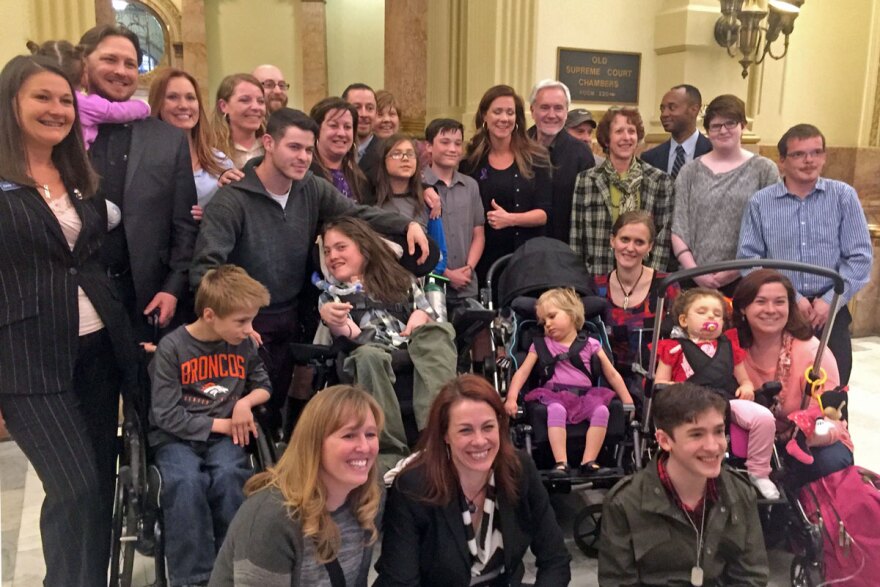Colorado schools may soon be forced to allow students to use medical marijuana in a non-smokeable form while on school grounds. It's already allowed under state law – but no districts have created access policies, leaving many families frustrated.
A bill [.pdf] under consideration at the capitol would require all school districts – even those without policies – to allow parents or caregivers to administer medical marijuana on school grounds, typically in the nurse's office. Students would not be allowed to take the cannabis tablet or put on the patch or oil themselves.
"Let's make sure they have the medication they need, and do it in an appropriate way," said state Rep. Jonathan Singer (D-Longmont), House Bill 16-1373's sponsor.
Jack Splitt, a 15-year-old Wheat Ridge High school freshman who has cerebral palsy and is confined to a wheel chair, told his story to state lawmakers with the House Agriculture, Livestock and Natural Resources Committee using his eyes to speak through a computerized speech assistant.
"With my cannabis medicine I feel good in my body and my mind. Then I can concentrate on school rather than wondering when the pain will stop," Splitt said.
"Because I can't stand the old medicine, it makes me so sleepy. I can't think, makes me a zombie."
Splitt's school won't let him reapply his cannabis patch while he's on school grounds. Medical marijuana has been legal in some states for two decades, but in many places like Colorado, the thorny issues about student use of a drug that is still illegal under federal law is just now being grappled with.
Jenny Stormes' son was suspended one day last spring for inadvertently bringing medical marijuana with him to his school near Colorado Springs.
"He lost his therapies, he was punished, and he didn't do anything wrong," Stormes said. "I'm the one who made the mistake."
Stormes' son has Dravet syndrome, a condition that produces constant seizures.
"If I bring cannabis on school I risk being arrested, his seizures risk increasing and since I can't give the cannabis on school grounds, my son has to miss a lot of school."
Falcon School District 49 is now developing a policy to allow students like Stormes to take medical marijuana. If adopted, it would be the first such policy in the state, even though lawmakers passed a bill in 2015 making it legal for schools to allow medical marijuana use. Legislators in both parties expressed dismay.
"Our school boards are deciding for the parents and the children between education and their medication. It's inexcusable, absolutely irresponsible. I'm absolutely appalled," said Rep. Steve Lebsock (D-Thornton).
The Colorado Association of School Board Executives testified against the bill.
"We do not lack compassion for individuals with disabilities," said chief counsel Kathleen Sullivan. "I've spent the last 20 years of my entire legal career working around issues of providing special education to students with disabilities in public schools."
Schools fear passing the law could jeopardize federal money that public schools rely on, Sullivan said.
"There is no way around the fact that federal law still recognizes marijuana as a controlled substance under Schedule I," she said. "Our local boards are afraid to gamble on that federal money without reassurances that they will be protected. Please don't make us do that. We have so much at stake already."
Rep. Singer dismissed the possible loss of federal funding, and blasted school districts for being hypocritical for denying medical marijuana to students while receiving other pot money.
"Since we have legalized marijuana, and we have legalized marijuana tax dollars, schools have been accepting those tax dollars," she said. "I'm always curious as to whether or not the schools are concerned about state sanctioned money laundering. That's another unknown but so far I haven't seen any school districts turn down those dollars for fear of federal sanctions."
Gov. John Hickenlooper also weighed in on the issue, saying he would personally try to make sure schools lost no federal money.
"I will call the Department of Education and ask them, 'is there any way you could possibly contemplate taking away funding without warning and at least letting schools figure out their error?' That's so hard for me to imagine, that that would happen without warning," he said.
It's estimated that about 300 students would be helped if the measures passes. While it easily cleared the committee, lawmakers in both parties have questions and concerns. Some want mandated policies, others said the state shouldn't tell school districts what to do and there should be opt-out provisions for school districts that don't have students who need medical marijuana.







